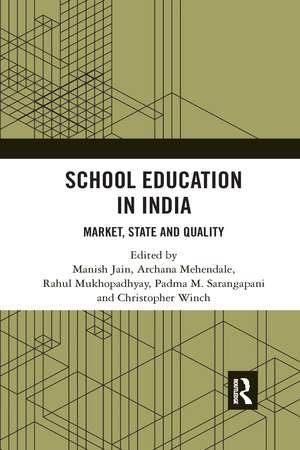School Education in India: Market, State and Quality
Editat de Manish Jain, Archana Mehendale, Rahul Mukhopadhyay, Padma M. Sarangapani, Christopher Winchen Limba Engleză Paperback – 18 dec 2020
Rich in primary data and supported by detailed case studies, this volume will be of interest to teachers, scholars and researchers dealing with education, educational policy, school education and public policy. It will also interest policy makers, think tanks and civil society organisations.
Preț: 386.39 lei
Nou
Puncte Express: 580
Preț estimativ în valută:
73.94€ • 77.04$ • 61.22£
73.94€ • 77.04$ • 61.22£
Carte tipărită la comandă
Livrare economică 03-17 aprilie
Preluare comenzi: 021 569.72.76
Specificații
ISBN-13: 9780367734626
ISBN-10: 0367734621
Pagini: 320
Dimensiuni: 138 x 216 x 20 mm
Greutate: 0.38 kg
Ediția:1
Editura: Taylor & Francis
Colecția Routledge India
Locul publicării:Oxford, United Kingdom
ISBN-10: 0367734621
Pagini: 320
Dimensiuni: 138 x 216 x 20 mm
Greutate: 0.38 kg
Ediția:1
Editura: Taylor & Francis
Colecția Routledge India
Locul publicării:Oxford, United Kingdom
Public țintă
PostgraduateCuprins
Introduction: Education in India between the state and market – Concepts framing the new discourse: Quality, efficiency, accountability Part I: Conceptual Papers 1. Public, Private and Education in India: A historical overview 2. Markets, State and Quality in Education: Reflections on genuine educational markets 3. Normative Articulations of the Aims of Education: An exploratory analysis 4. Regulatory State and the Diversified Private 5. Recovering the Practice and Profession of Teaching 6. Notes on Quality in Education Part II: Empirical studies 7. Hyderabad’s Education Market 8. Schools, Market and Citizenship in Delhi 9. Curriculum as a Dimension of Quality: Its production and management in schools in Hyderabad 10. Management of Home–School Relationship: Role of school principals in low-fee private schools 11. School Quality: Parent perspectives and schooling choices 12. Teaching Because It Matters: Beliefs and practices of government school teachers
Notă biografică
Manish Jain is Associate Professor at the School of Education Studies, Ambedkar University Delhi, India. He had been a school teacher prior to this for 10 years. His teaching and research interests lie at the intersections of history, politics and sociology of education.
Archana Mehendale is Professor at Tata Institute of Social Sciences, Mumbai, India, and leads the research programme of the Connected Learning Initiative. She has researched and published in the area of child rights, but more specifically on education law and policy, inclusive education and early childhood education.
Rahul Mukhopadhyay is Visiting Faculty with the School of Education, Azim Premji University, Bengaluru, India. His research interests are sociology of education, educational policy, sociology of organisations and anthropology of the state.
Padma M. Sarangapani is Professor of Education, Tata Institute of Social Sciences, Mumbai, India. Her current areas of work and research include teacher education, quality in education, culture and education and school systemic change at scale.
Christopher Winch is Professor of Educational Philosophy and Policy in the Department of Educational Studies at King’s College London. He researches in the areas of philosophy of education, professional knowledge and qualifications and European VET policy tools. He has a long-standing interest in policy issues in education in India.
Recenzii
‘This volume comprises a timely and strategic contribution to a field that has so far remained neglected in India despite its crucial importance and role in enabling massive changes to take place without being noticed as such. The use of ‘quality’ as a term has permitted an alliance to emerge between the state and the market. Readers will find in this volume both conceptual and empirical writings that help to recognize and analyze the ‘quality’ discourse with pointers to the political economy in which this discourse grew without drawing attention to itself.’ - Krishna Kumar, Honorary Professor of Education, Punjab University; Retired Professor, Department of Education, University of Delhi; and former Director, National Council of Educational Research and Training, India
‘This is an important book. India’s school system is significant for international education debates not only as one of the world’s largest but also as a site of many experiments, particularly regarding the roles of markets and states. This collection engages critically and thoughtfully with what is happening in Indian schooling and offers new insights for the international education community.’- Simon McGrath, Professor and Associate Head of School, School of Education University of Nottingham, UK; and UNESCO Chair in the Political Economy of Education
‘An exceptionally rich volume that ruthlessly challenges the contemporary concepts and theories that have shaped policy on education in India! Its fresh theorisation and nuanced conceptualisation blends long forgotten philosophical aims of school education and notions of equity in India. Must be read.’ - Shantha Sinha, former Professor, University of Hyderabad; and former Chairperson, National Commission for Protection of Child Rights, India
‘This is an important book. India’s school system is significant for international education debates not only as one of the world’s largest but also as a site of many experiments, particularly regarding the roles of markets and states. This collection engages critically and thoughtfully with what is happening in Indian schooling and offers new insights for the international education community.’- Simon McGrath, Professor and Associate Head of School, School of Education University of Nottingham, UK; and UNESCO Chair in the Political Economy of Education
‘An exceptionally rich volume that ruthlessly challenges the contemporary concepts and theories that have shaped policy on education in India! Its fresh theorisation and nuanced conceptualisation blends long forgotten philosophical aims of school education and notions of equity in India. Must be read.’ - Shantha Sinha, former Professor, University of Hyderabad; and former Chairperson, National Commission for Protection of Child Rights, India
Descriere
This volume examines how the public and private domains in school education in India are informed and mediated by current market realities. It moves beyond the simplistic dichotomy of pro-state vs pro-market factors that define most current debates in the formulations of educational reform agendas to underline how they need to be interpreted in
